Priority Research Areas and Topics
Welcome to The Stephen and Nancy Grand Water Research Institute at the 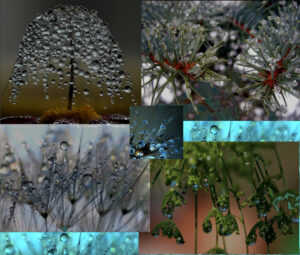 Technion.We operate as the Israeli national institute for research in the science, technology, engineering and management of water resources. Established in 1993, the mission of the GWRI is to be a center of excellence of international caliber, the leading water research institute in Israel.
Technion.We operate as the Israeli national institute for research in the science, technology, engineering and management of water resources. Established in 1993, the mission of the GWRI is to be a center of excellence of international caliber, the leading water research institute in Israel.
Main Research Areas
Water Treatment, Desalination, and Treatment of wastewater
- Water treatment (physico-chemical, biological);
- Advanced desalination technologies;
- Membranes: design-synthesis-modifications-testing- modeling;
- Energy saving and environmental aspects;
- Wastewater treatment: biological, chemo-physical, membranes, SAT;
- Nanofiers/Nanotubes/Nanochannels (concentration-polarization);
- Post-treatment of desalinized sea water;
- Treatment of industrial wastewater;
- Grey-water recycling and management aspects.
Preservation of water resources, Hydrology – source quantity and quality, Wastewater reuse & efficient irrigation
- Hydro-geophysics;
- Hydrological processes, including climate change effects;
- Monitoring & Modeling at various scales;
- Forecasting scenarios;
- Fluid-dynamics of complex water systems;
- Development of advanced analytical and monitoring tools;
- Investigation of nutrients, salinity and pollutants fate in water affected systems;
- Reuse of reclaimed wastewater for sustainable crop production;
- Water use efficiency.
Water and environmental microbiology
- Applied Genomics and Water Microbiology;
- Pathogen survival in water systems and in plants irrigated with reclaimed wastewater;
- Tracing microbial processes in water and wastewater treatment systems;
- Advanced methods for bacterial detection;
- Microfluidics-for advanced bio-sensing.
Management of urban water systems, Water resources management and policy Water resources systems analysis
- Management of Water distribution systems;
- Utilization of evolutionary single and multi-objective optimization models;
- Security and reliability aspects;
- Stochastic/deterministic systems;
- Water resources under uncertainty and risk;
- Water sensitive planning;
- Enviromatics- utilization of distributed multi-modal (physical, chemical and biological) sensor networks for water sensing and decision making.
Equipment and Infrastructure
The GWRI Equipment Committee develops, under guidance of the Management 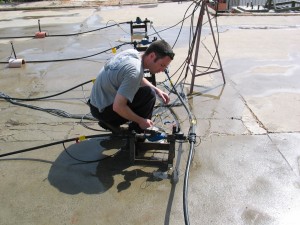 Committee, the policy and procedures for procurement and use of equipment. It then conducts the call for proposals and requests for new equipment, and manages the purchase, installation, maintenance and charges for use. Equipment is usually purchased jointly with academic faculties. A User’s Manual lists all GWRI equipment and the conditions for its use.
Committee, the policy and procedures for procurement and use of equipment. It then conducts the call for proposals and requests for new equipment, and manages the purchase, installation, maintenance and charges for use. Equipment is usually purchased jointly with academic faculties. A User’s Manual lists all GWRI equipment and the conditions for its use.
Support of Young Scientists
Israeli universities and research institutions, as well as all agencies and companies in the water sector, 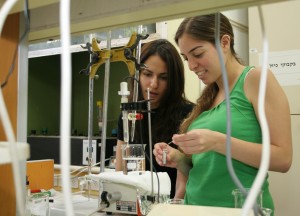 lack a cadre of young people.
lack a cadre of young people.
The shortage is most acute in the research community. TheGWRI seeks to promote young scientists by providing special funding to talented individuals who are making their first steps as researchers.
GWRI Building
The Grand Water Research Institute Building has two floors: the first includes the Information Center, offices, seminar and lecture room, services, and a large foyer with 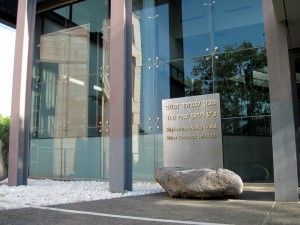 space for displays and for informal meetings. The second floor contain a central equipment laboratory, a number of individual laboratories, and additional meeting and seminar rooms.
space for displays and for informal meetings. The second floor contain a central equipment laboratory, a number of individual laboratories, and additional meeting and seminar rooms.
Regional and International Collaboration
Several research initiatives are being pursued at this time, in collaboration with researchers and institutions abroad. These include: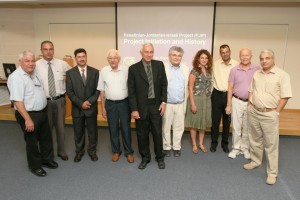
Water reclamation projects within the framework of the European Community
Water Desalination projects supported by the Middle East Desalination Research Center
USAID Middle East Regional Cooperation Program (MERC) – Appropriate Technology for Wastewater Treatment and Reuse in Rural Middle East Areas
Palestinian – Jordanian – Israeli Cooperation on Water reuse for irrigation – supported by WEI resources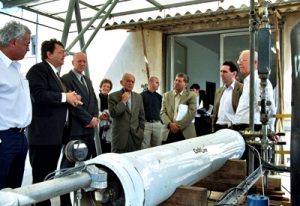
Middle East Wat Project – led by Professor erFrank Fisher from MIT- with teams from Jordan, Israel and the Palestinian Authority
WaterNet Project: The Norwegian government is sponsoring a regional electronic information system on water related issues